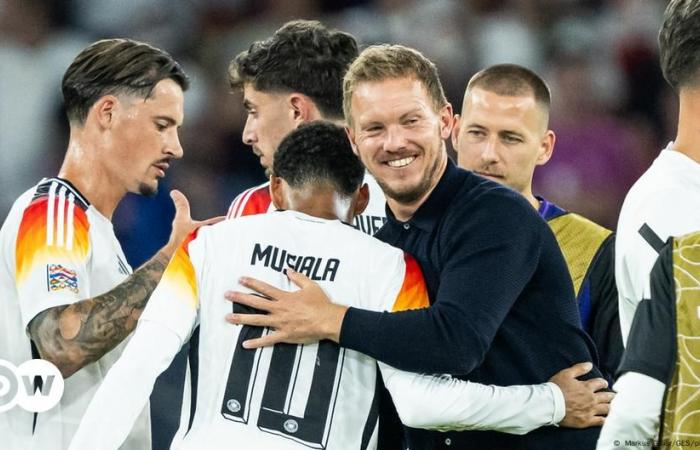Amidst a conversation about packed playing schedules, a country coming to terms with the prospect of a snap election and the unappealing nature of dark mid-November evenings in central Europe, the return of international football feels untimely.
Yet, for the sold-out crowd in Freiburg who watched Germany hammer Bosnia and Herzegovina, Julian Nagelsmann’s team remains a draw.
This team is exciting to watch. Maybe it’s because they scored seven goals (their highest win under Nagelsmann). Maybe it’s because half of the team gave their jackets to the kids shivering in front of them during the national anthem. Maybe it’s because in Jamal Musiala and Florian Wirtz they have two of the most thrilling players in football at the moment.
Maybe it’s because they are playing well and winning, and in the face of endless sources of entertainment all clamouring for attention, that is a decisive factor. Musiala scoring a header after just 79 seconds from a delightful Joshua Kimmich cross? Sign me up, log me in, book my ticket.
Bosnia were not on the same level, but it wasn’t long ago that Germany would have waded through such games. Now, they are gliding through them. Tim Kleindienst nonchalantly scoring goals in the box like a veteran striker, Wirtz dancing around the field like he was playing a video game — the joyous memory of Euro 2024 might feel like a long time ago, but this is a team still enjoying itself with same summer flair.
Injury concerns grow
Despite the enthusiasm towards watching Germany, these games have come under increased scrutiny of late as calls about load management from players’ union FIFPRO and prominent players grow ever louder. Joshua Kimmich’s going off late with a knock was another such reminder
Injury was the reason Germany’s promising young midfielder Angelo Stiller left camp, striker Deniz Undav never even joined up with the national team this month and Jamie Leweling, the breakout star from last month’s Germany game, didn’t have the chance to continue his momentum.
“The muscles usually need four to five days to fully recover after a 90-minute football match, depending on the strain on the player,” Professor Wilhelm Bloch of the Sports University Cologne recently told DW.
The season hasn’t even reached the halfway stage yet, but that recovery period is often being ignored for players at the top of the game, with the limits of their physical and mental wellbeing being tested.
Nagelsmann’s team selection is also being pushed to the limits, although the former Bayern Munich coach was reluctant to criticise the playing schedule. The 37-year-old believes the break in between seasons should be longer, citing the NBA as an example. The last NBA off season lasted 136 days.
The 2025 Champions League final in Munich is on May 31, and just 15 days later the 32-team Club World Cup starts. A break in the triple digits feels little more than a pipe dream for Germany’s star footballers, but if injuries continue, then an already empowered playing group will surely feel more compelled to take a stand.
A year to remember
For now though, football inevitably continues, as will the hype around this Germany team. With qualification for the quarterfinals of the Nations League already secured, the win against Bosnia confirmed their top spot and makes their final game of the year nothing more than a formality.
As the end of 2024 approaches, much remains unclear about the next few months for Germany. The same is not true of the country’s football team. Julian Nagelsmann’s side is delivering when it comes to consistency and efficiency. And, with Wirtz and Musiala in their current form, Germany remain incredibly appealing whatever the fixture, whatever the time of year.
Edited by: Kalika Mehta






